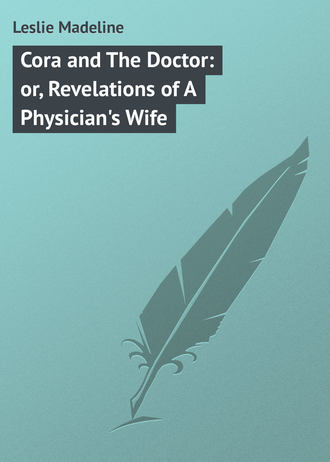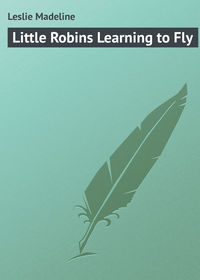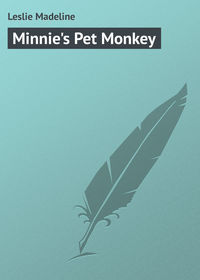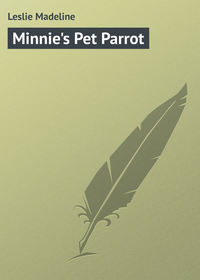
Cora and The Doctor: or, Revelations of A Physician's Wife
She put the whole into my hands, saying, "Dear mamma, you gave them to me," and she hid her face on my shoulder. Judge of my surprise when I found letters and scraps of letters dating back as far as 1836, when Joseph was a gay boy. In truth almost every one of them contained some message to his young friend.
Then there was a sheet of scribbling, with the names, Joseph Lenox Morgan and Pauline De Lacy Lenox, written in every variety of penmanship, in cousin's bold hand. These were interspersed with pictures evidently drawn to please a young child; a tall gentleman leading a little girl; then a young lady taking the arm of her companion, while underneath were written the names "Joseph and Pauline." These were the precious mementos which she had hoarded with as much care as the miser does his gold; and she confessed with tears, that when Adele was with us at Nice, almost her only comfort consisted in reading over and over these messages of love.
"When Eugene told me of his affection for me," she added, with a slight shudder, "I thought I ought to destroy them; but I had not the strength to do it."
I pressed the artless child to my heart, as I said, "And when I blamed you for treating Joseph so ill, did you love him then?"
"Oh! mamma," said she weeping, "how I longed to tell you all about it! I never knew until Joseph came, how much I loved him. But then I knew also that Eugene loved me and desired me to return his affection, and I feared it would be wrong toward him, for me to show my strong attachment to my cousin. Besides I thought Joseph would despise me if he saw my regard for him while another sought my heart and my hand."
Thursday, October 2d.Yesterday morning, at eleven o'clock, my dear Pauline was married. I cannot yet realize that she has left me. The young couple started directly on their wedding tour, and will return in a fortnight to pass a few days with us, before they go to B – , where she is to be for the present, in the family of her father-in-law. It is their wish to give up the whole management of the household to her. But Joseph prefers to wait until she can determine for herself whether she will board with them, or whether the new couple shall set up a separate establishment and keep house by themselves. In the midst of all my sadness, I cannot but smile at his treatment of her. He listens to her words, as to oracles of wisdom, and is as tender of her as a father of an only and a feeble daughter, while she is the very picture of health and cheerfulness.
But I forget that I have told you nothing of the wedding, – the company, – the ceremonies and the bridal gifts. I allowed Pauline to make her own arrangements, and was not a little surprised and delighted at her characteristic choice of bridemaids. In all her plans, Eugene and Nelly were zealous, if not able advisers; and I doubt whether any young masters or misses were ever more elated than were those appointed to this service.
Upon Monday evening, Joseph arrived with uncle and aunt Morgan. Uncle presented his intended daughter with a splendid service of plate, manufactured expressly for her; and aunt, with a bridal veil which Joseph had imported for her. Tuesday evening a large box arrived from Lee Hall, directed to "Mrs. Joseph Morgan elect." Poor Pauline was kept very rosy from morning till night, by Eugene's continual practice on the enunciation of this new name, that he might obtain its sweetest and most approved accent. The dear girl was almost overcome by this public recognition of her new title. On opening the box, it was found to contain a magnificent silver urn with slop-bowl to match, lined with gold. This gift was from our dear friend, Mrs. Mansfield. Many other appropriate and rich presents were received from friends, which I have not time to specify, as I must hasten to my account of the wedding.
It was private, but few being present, as Pauline is to meet her friends on her return, and has appointed the twenty-first of October, her father's birth-day, for her wedding party.
On Wednesday morning, at eleven o'clock, the time appointed for the ceremony, Eugene ushered us into the parlor, where we found Allen and Lucy, Dr. and Mrs. Clapp, Miss Proctor, uncle and aunt, Mr. Benson and Emily, and our dear mother with our beloved pastor and his family, while Cæsar, Phebe, Ruth and Ann filled up the back ground, and gave an agreeable variety to the shading of the picture. Eugene formally conducted the Doctor and myself to the seats of distinguished guests, and then retired to fulfil his duty as master of ceremonies, which from the youthfulness and inexperience of many of the company, and the perfect order with which they entered the room, must have required no little skill in the training.
First entered Eugene and Nelly; then Charles Karswell and Anna Reynolds, who are shortly to be married; next Henry Marshall, grandson of our friend the Attorney General, and Emily Lenox Mansfield; next Franky Lenox and Susy Benson, while Willie Reynolds and little black-eyed Hatty Clapp brought up the rear. These all walked, with the order and dignity befitting the occasion, to their proper places, leaving a vacant space in the centre for the young bride, who entered last, leaning on the arm of him whom she had loved "from very childhood up."
Truly, they were a noble pair. He was tall and erect, with a broad, high brow, and eyes beaming with fondness upon the fair face so confidingly upturned to his own. She wore a white satin dress with an over-dress of gossamer lace. Her hair, which she always wore in natural curls, falling upon her neck, was looped up at the sides with a wreath of orange flowers, that also confined her veil. Sister Emily, who, with Lucy Mansfield's assistance, dressed the bride, and gave the finishing touch to the dress of all the young men and maidens, was much delighted at the complete success of her efforts. Rev. Mr. Munroe, by a few mystic words made the twain one forever. Then after prayer for a blessing on the happy union, all walked up to salute the bride.
Though my heart was overflowing, yet I had been able to command myself until my husband led me to the bride. I tried to speak, but finding my voice inarticulate, hastily kissed her and retired for a few moments to recover myself. When I returned to the room, Cæsar was passing the cake, while his countenance wore a ludicrous mixture of sorrow and delight. He evidently felt a strong inclination to weep; but his duties rendering this inappropriate and inconvenient, he tried to assume an expression of the joy which he conceived to be more befitting the occasion.
Uncle and aunt Morgan will remain with us until after Pauline's return and levee. A list of the persons to be then invited she put into the hand of her brother Eugene. The day before she went, she consulted me about the number she should invite. I replied, "just as many as you please, and just whom you please."
From her choice of bridemaids, I rather think, there will be a miscellaneous company. But if it gives the dear girl pleasure and affords her an opportunity to take leave of friends, to whom she is ardently attached, I shall be satisfied.
Both she and Eugene were delighted that the levee would occur on their father's birth-day. Emily Benson has brought her babies to make us a family visit while uncle and aunt Morgan are here, so that I have no time to be lonely.
CHAPTER XL
"How few, like thee, inquire the wretched out,And court the offices of soft humanity!Like thee, reserve their raiment for the naked,Reach out their bread to feed the crying orphan,Or mix the pitying tears with those that weep!" Rowe.Wednesday, October 22d.Last evening the company began to assemble for the levee at an early hour, and consisted of persons selected without any reference to the accidental distinctions of wealth and rank. Mr. Marshall, the attorney General, and Thomas Jones the reformed inebriate, but now one of the most respectable and respected citizens of the town, were in close proximity. Here too, were Mr. Allen and Mrs. Lucy Mansfield, at the head of the wealthy aristocracy, in animated conversation with William and Anna Reynolds, once so oppressed with poverty. Mr. Benson and Emily, who would anywhere be recognized as persons of true refinement and grace, bestowed special attention upon those present, who were unaccustomed to such scenes, and on that account timid and reserved. A table was extended the entire length of the dining room, and bountifully crowned with delicacies and luxuries, of which at the proper hour all were invited to partake. The bride and bridegroom with their train, who were in attendance as at the wedding, mingled with the company and addressed a kind word to each.
There were so many children and young people present who were obliged to leave at an early hour, that the Doctor, after consultation with me, requested Mr. Munroe to close this interesting interview with prayer. Instead of complying immediately with this request, I noticed that Dr. Clapp stepped forward and said something to the Doctor, and then suddenly left the room in company with the reverend gentleman, Mr. Marshall, Allen Mansfield, and one or two others. I looked at Frank, wondering what this could mean. He whispered to me, that Dr. C. wanted to have a little singing. I was still more puzzled when Emily Benson touched my arm and desired to speak with me. "They have found out," said she, "that it is Frank's birth-day, and want to sing a hymn in honor of the event. Take his arm and keep him quiet, just where you are." She then went and led mother and the children near me, and taking her husband's arm, stood behind us.
The gentlemen returned, and Dr. Clapp, who is a fine singer, commenced the following hymn, in which he was joined at first by nearly all the company except our immediate family:
To him who e'er hast lent a handIn hours of direst woe,Who like a brother led the way,And showed us how to go;To him who oft has bowed the kneeBeside the lowly cot,Here thanks we give, here thanks we pay,On this thy natal day.Kind benefactor, brother, friend,Our words but feebly tellThe gush of love comes over us,And in our bosoms swell,For all thy kindness, all thy careFor souls by sin oppressed,Here thanks we give, here thanks we pay,On this thy natal day.May He who in his precious wordDeclares the giver blessed,E'en far beyond recipients,Pronounce thee doubly blessed;And as swift years their circles speed,May lover, children, friends,Combine to bless thy natal day,As we our thanks do pay.I never knew Frank so much overcome. He put his handkerchief to his eyes, and then made a movement as if he were meditating an escape from the room; but I whispered, "don't leave me, Frank."
When the singing terminated, Rev. Mr. Munroe stepped forward and began to make a speech. My heart beat very fast; and for a moment I felt as if I were going to be married. I was so much overcome that I could not hear all that was said, but the next hour was occupied with speeches addressed to the Doctor, by Rev. Mr. Munroe, Mr. Marshall, Dr. Clapp, and Thomas Jones; each of whom in a most delicate manner, spoke of his happy influence and professional services. Mr. Munroe said, "No one could fully estimate the value of the labors of a pious physician this side of eternity." "Everywhere," he continued, "among this people, I find occasion to bless God for locating me in a parish where those labors abound."
Dr. Clapp thanked my husband for his kind attention, encouragement and friendship, and concluded by saying "I owe all my present ease and comfort to you, Dr. Lenox."
Allen Mansfield followed him, and in glowing terms spoke of the blessings for which under God he and his were indebted to Frank, and to our family.
Next Thomas Jones came forward to acknowledge his obligations. He commenced in a lofty strain. "Dear sir, I speak not for myself alone, but for a large class in the community, some of whom I see standing around you and your worthy lady and family, persons who through your instrumentality." – Poor man, his emotion choked his utterance, and he suddenly stopped, caught the Doctor by the hand, and broke out in a more natural and therefore impressive strain; "Oh, sir, think what I was when you found me, took me out of the ditch, led me home by the hand, encouraged and warned me, prayed with me and for me; think of me, a poor besotted drunkard, frightening my own wife and children, and see what your kindness has made of me and of them. I say with Dr. Clapp, that under God, I owe all this to you, Doctor; and there's many here whose hearts are saying the same thing. God bless you, Doctor, your beloved wife and children; and may he also bless us, and gladden our hearts, by many returns of your birth-day. Mr. Willard had prepared me a fine speech for the occasion; but before I got through the first sentence I forgot the whole of it." This frank acknowledgment suddenly turned the sorrow that was suffusing so many eyes into a roar of laughter, in which even the weeping Doctor could not but unite.
Finally, Mr. Marshall presented himself and said, "Dr. Lenox, there are many persons in this company who have it in their hearts to reiterate the remarks of Mr. Jones, Dr. Clapp and others who have addressed you; but the lateness of the hour forbids them the pleasure. Enough has been said to convince you, their esteemed friend and physician, that your labors have been neither in vain, nor unappreciated. In their behalf and in my own behalf, I thank you for your ministrations of kindness, for your charity to the poor, and your relief of the distressed; and I cordially unite with them in the desire that your life and valuable services may be long spared to us, and to the community in which we live. I conclude with this sentiment: "Our beloved physician – he has sown bountifully, may he also reap bountifully, harvesting esteem in this world, and life eternal in the world to come."
"Thy natal day —And duly shall our raptured song,And gladly shall our eyesStill bless this day's return, so longAs thou shalt see it rise."When he had closed, Mr. Marshall, perceiving that the Doctor was too much overcome to attempt a reply, turned to the pastor, who concluded the service with a solemn and impressive prayer. There was hardly a dry eye in the room, while Cæsar and Phebe, who stood in the rear of our family, sobbed aloud. The Doctor kept his handkerchief to his eyes, and he told me afterwards, that it was with difficulty he could support himself.
After prayer, the company bade us good night and retired. The next morning, at family prayers, I was delighted to hear my husband pray that he might not be led to take to himself that glory which was due to God alone; but that the late scene might humble him and render him more diligent in his master's service.
Friday, October 24th.This morning, before Pauline's departure, Eugene put into her hand, legal documents conveying to her one half of their deceased father's estate. Uncle and aunt Morgan are to return with the bride and bridegroom. Charles Karswell and Anna Reynolds are to be of the party as far as New York city, and Eugene to New Haven, where he is to resume his place in the senior class in Yale College, which he entered at the last commencement.
Now that they all have gone, I begin to realize that Pauline, the child of my heart, has left me, and in spite of all my efforts at resistance, a sadness steals over my spirits. I try to compose myself, and to realize some comfort from the thought my dear husband holds up to my view, that I have gained a son. But as yet I can only remember that I have lost the society and companionship of my lovely daughter; I think that Frank feels her loss almost as much as I do; for though he appears very cheerful, yet there is a pallor about his mouth which I have always noticed when his feelings are deeply moved. I heard him as he left me to visit his patients humming a lively tune; but I knew that he only did it, as boys whistle in the dark, to keep their courage up.
CHAPTER XLI
"When all the fiercest passions cease,(The glory and disgrace of youth;)When the deluded soul in peace,Can listen to the voice of truth;When we are taught in whom to trust,And how to spare, to spend, to give;(Our prudence kind, our pity give,)'Tis then we rightly learn to live." Crabbe."Papers relating to my beloved Imogen, to be read by my son on his attaining his majority. H. C. S"My dear son Eugene, – When you unseal this packet, the hand which wrote this brief account of your mother, will be mouldering in the dust. When you have read it, you will need no farther explanation of the cause of that sorrow which has brought me to the grave. Nor will you wonder that I could never enter upon the subject so often and so naturally referred to by you.
"My beloved Imogen, your mother was born in Nice, of highly respectable and wealthy parents. The estate on which they lived, which has of course much depreciated in value, together with funds in Paris, enabled them to live in comfort, and to bestow upon their only child, Imogen, the best advantages of education.
"In the autumn of 1828, I went to Rome for the winter. There I first met her, whose image from that hour to the present has never left me. Though her great personal beauty, both of face and figure, joined to her remarkable mental endowments, rendered her the object of universal admiration, yet I alone won the affections of her generous heart, a heart which, though warm and impulsive beyond even the daughters of her native clime, was pure as that of a vestal.
"But my throbbing pulse and trembling hand warn me not to delay at this point of my story. Suffice it to say that I returned with my beloved Imogen to Nice, and our betrothal receiving the sanction of her parents, we were married; their only condition being a promise from me, that when I was ordered abroad, (I was then in command of troops in his majesty's service,) she should return to them to remain during my absence.
"No language can describe to you the happiness experienced by us during the few years which followed. An amount of happiness not often vouchsafed to man. Alas! alas! I sought nothing beyond the felicity of the present hour. I adored my wife, and lovely boy, but forgot even the being of that God, who had blessed me so far beyond the common lot of mortals. But early in the year of 1833, I was fully awakened to a sense of my bliss, by the thought of the terrible separation which had now become necessary. I received orders to join my regiment and go to India. I had taken one furlough after another, but now there could be no more delay. In the first frenzy of her despair at losing me, Imogen insisted upon accompanying me. But earnestly as my heart seconded this appeal, I could not be so rash as to allow it. It was within a few months of her accouchement; and I determined not to leave her until she was safe in Nice under the care of her parents. This, however, circumstances compelled me to do. At this crisis, Ralph Mortimer, a young officer, who was dear to me as a brother, arrived in England. He had sold out his commission, and was intending to go to France to recruit his wasted strength and spirits. I met him accidentally, and in a few moments had communicated to him the nature and depth of my affliction. He was somewhat roused from his melancholy by my distress; and without detailing minutely what followed, it was at length decided that I should remain with my family until the time of sailing, and then Mortimer would proceed to Nice with Imogen and our boy. I presented every possible inducement to him to remain in Nice, that I might feel in case of her parents' death, or any unforeseen event, that my dear wife would have a protector. She, however, in private informed me that she feared constant intercourse with a man so morose and melancholy would only prey upon her spirits. But I hoped much from her influence to overcome this morbid state, and as there was no living being in whom I had such entire confidence, I rather urged this upon her. My friend I believed to be the very soul of honor and – But I cannot go on. I have been thus particular to show you that I was the only mover in these arrangements for her comfort during my absence; and that she unwillingly agreed to them solely out of her affection for me; often repeating, that in the society of her parents, and with the affection and nurture of her beautiful boy, she should endeavor to pass away the time, and count the months when I should return to her arms.
"Passing over the frantic grief of my loved Imogen from whom I was obliged forcibly to tear myself away, I went mechanically on board the vessel which I regarded with horror as the one that was to bear me far from all I loved; nay, idolized. Mortimer accompanied me, and I was startled from my brief unconsciousness and unconcern of what was passing, by his approaching to take leave.
"Drawing him passionately to a retired part of the vessel, I there extracted from my friend a promise that after accompanying her to her parental home, he would under all circumstances watch over her with the affection of a brother; that he would never cease his efforts for her happiness or prosperity. All this, he solemnly promised out of regard to our early and long tried friendship. Afterwards I let him go.
"During the ensuing year, I received letters from home announcing the birth of a little daughter; and also the sudden death of my wife's father, which latter event was quickly followed by the decease of her mother.
"Imogen was now alone, and Mortimer, though still an invalid, prompted by his desire to fulfil his promise to me, spent much of his time in her blissful society, having his rooms at the hotel, which was near her residence. It was his delightful privilege to watch the unfolding of our two precious buds of promise, to administer consolation to his sorrowing charge in her successive bereavements. Alas! alas! while soothing her grief, a pang entered his own soul. He suddenly awakened to the fact that he loved one, whose innocent purity of thought and action were at every meeting more and more apparent. He loathed himself for his perfidy to the brother of his early affections; that he had thus returned the generous confidence which had confided to him in perfect trust, the wife of his youth, the chosen companion of his heart.
"But I am anticipating. Toward the close of the year 1834, I received a letter, purporting to be from a gentleman residing in Nice, and who professed great interest in me. This letter, though cautiously written, yet more than hinted at the unfaithfulness of my wife, and the perfidy of her companion, Ralph Mortimer. When I received it, like the bite of a poisonous serpent, it instantly diffused itself through every vein in my body. I gnashed my teeth that I could not get my hands upon the villain, and tear him to pieces. But I was thousands of miles away, and must bear my dishonor as best I might. After a night, spent in such horror as no words can describe, I determined to resign my commission, to sacrifice everything in order to get home. What was to become of me when there I never thought. But before I could accomplish my wishes, the idea which waking or sleeping was ever before me, of him whom I considered too vile, even for the company of devils, in the constant society and love of my hitherto adored wife – this idea so wrought upon a frame enfeebled by a hot climate, that I was laid upon my couch with fever. So violent was this attack, that there was no hope of my recovery. For weeks, I lay unconscious; but when I recovered my reason, and was told I could not live, I knew better. I was sure I should be allowed to unmask the traitor, and expose Mortimer to infamy. I was right. I recovered so rapidly that the most sanguine expectations of my friends were more than realized; and far sooner than I had even dared to hope, I was ready to sail for England. But I had nearly failed in this, for when about to embark, having all my goods on board, I received another letter, containing intelligence which had I doubted before, would now, alas! have left no farther room for doubt. Burning with rage, I was carried on board ship, where, by a dreadful relapse of fever, I was brought a second time to the borders of the grave. Again mercy interposed, and I partially recovered. But I felt no gratitude for restored health, – no thanks to the Being who had preserved me amidst so many dangers. All the feelings of my soul were concentrated into one burning desire for revenge, and every moment which delayed this, was an age to my impatient spirit.









